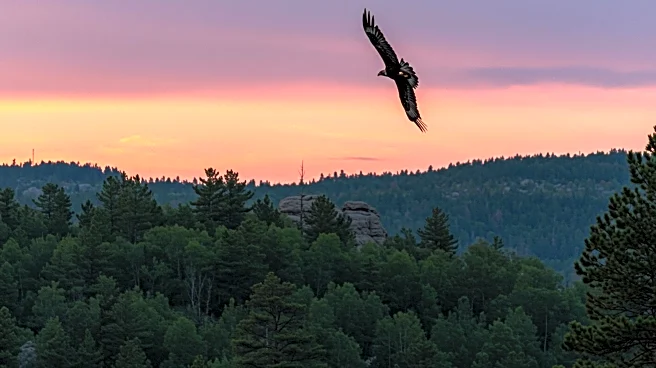What's Happening?
Dakota Gold is planning to open a new open pit mine in the Black Hills of South Dakota by 2029, driven by soaring gold prices. The company aims to capitalize on the current high value of gold, which has reached over $3,000 an ounce. This development has sparked controversy due to potential environmental impacts and opposition from Native American tribes and environmentalists. The Black Hills, a region sacred to the Lakota Sioux people, is already home to one active gold mine operated by Coeur Mining. Dakota Gold's proposal includes exploratory drilling sites that could lead to additional mining operations, raising concerns about landscape changes and water contamination.
Why It's Important?
The proposed mining activities in the Black Hills could have significant economic and environmental implications. On one hand, Dakota Gold estimates that the new mine could create up to 250 jobs and generate substantial tax revenue for South Dakota. On the other hand, the environmental risks associated with modern gold extraction methods, such as the use of cyanide, pose threats to the region's ecosystem and sacred sites. The controversy highlights the ongoing tension between economic development and environmental preservation, with Native American tribes and environmental groups voicing strong opposition to the mining projects.
What's Next?
Dakota Gold plans to conduct environmental studies and surveys to ensure safe operation of the proposed mine. However, opposition from Native American tribes and environmentalists is likely to continue, potentially leading to legal challenges or demands for stricter regulations. The company will need to navigate these concerns while seeking approval from state and federal agencies. The broader debate over mining in the Black Hills may also prompt discussions on balancing economic interests with cultural and environmental preservation.
Beyond the Headlines
The mining controversy in the Black Hills underscores deeper issues related to land rights and historical injustices faced by Native American tribes. The U.S. government seized the Black Hills from the Sioux Nation after gold was discovered, despite a treaty recognizing their rights to the land. The Sioux have not accepted compensation and continue to assert their claim to the region. This historical context adds a layer of complexity to the current mining debate, highlighting the need for sensitive and equitable solutions.









